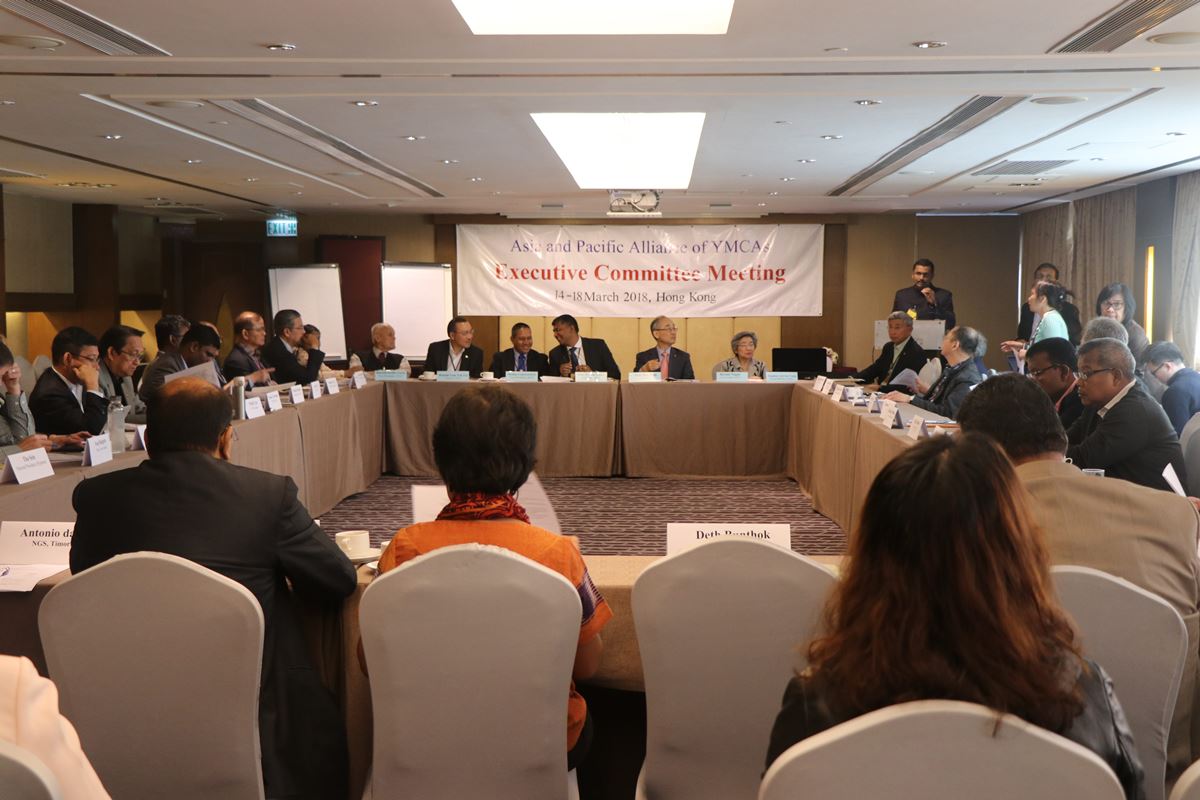 |
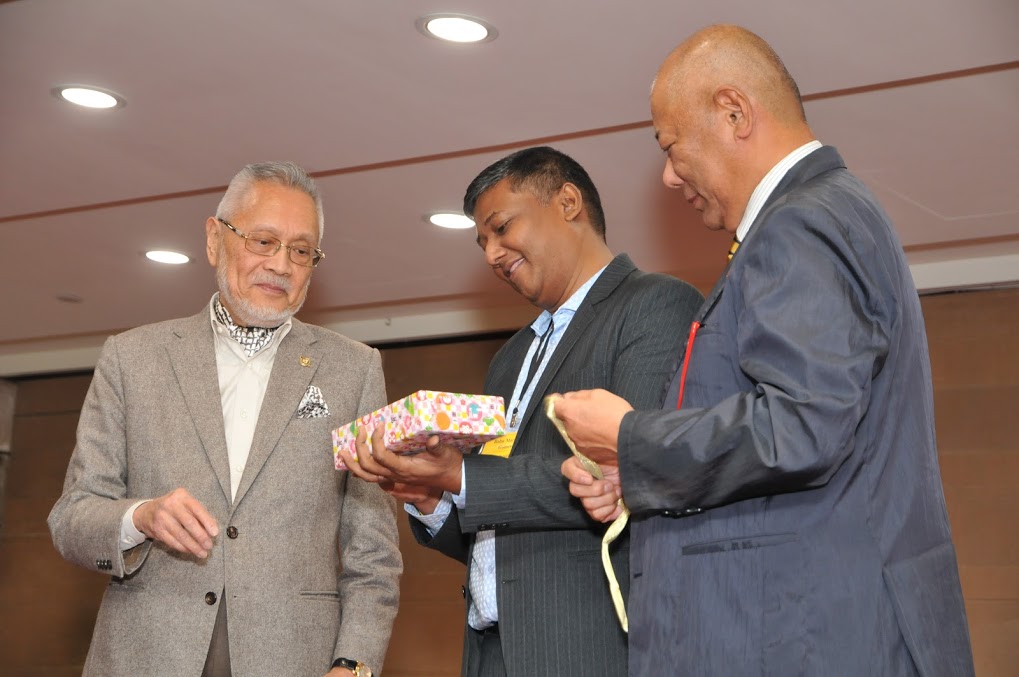 |
| ↑ Standing Committee Meeting Reports being presented during the Executive Committee Meeting Plenary.
|
↑ (From left) Dr Philip Kwok, GATF Trustee, Mr Babu Markus Gomes, APAY President and Nishimura Takao, YMI General Secretary facilitates launching of APAY Book entitled, "Light to Our Path: A compilation of Biblical Reflections".
|
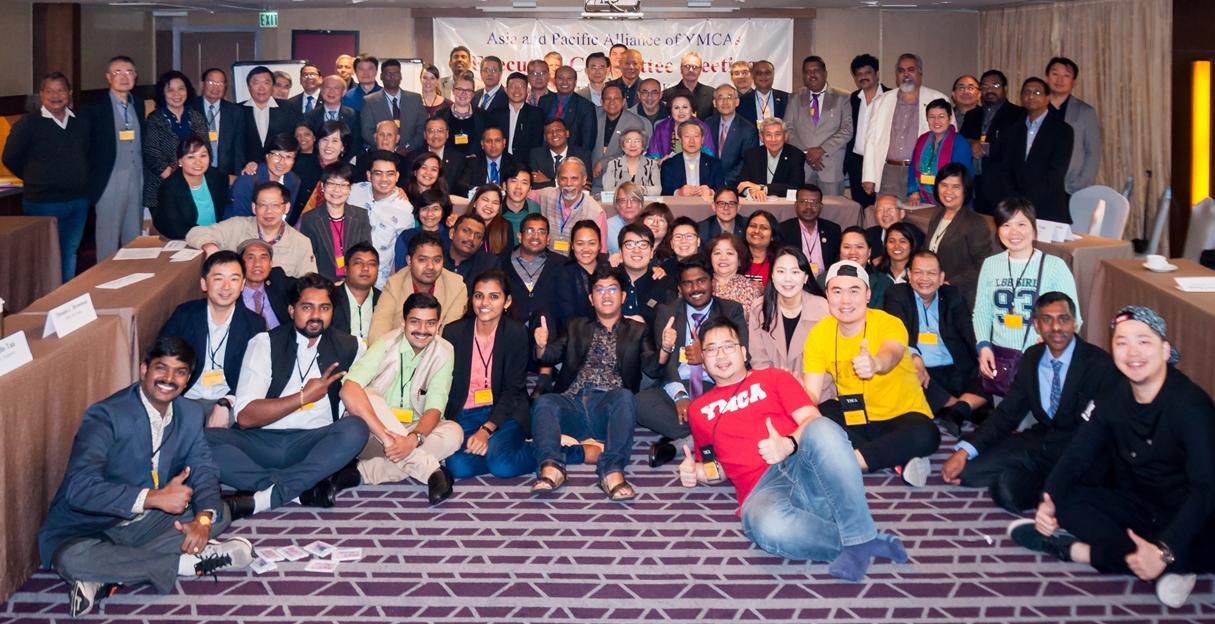 |
| ↑ APAY Executive Committee Members together with Standing Committee Members and Observers, guests and ecumenical partners during ECM group photo.
|
Mission Review Session
Dr. M.P. Joseph, a theology professor, called on the ECM participants to revisit the mission priorities of YMCA considering speculative finance capitalism. Today, giant capitalist institutions distort the meaning of development and pursue projects that violate the dignity of human beings. The turning of persons into disposable commodities is exemplified in the phenomenon of the migrant workers. Hedonist, death-dealing neoliberal economy, and finance capitalism have changed the world by desecrating life. Thus, YMCA must revisit its mission and self-evaluate to redefine its identity considering Jesus’ call to discipleship. The theology of hospitality must be strengthened, for one sees God’s face in the face of the stranger. In relation to this, the “muscular theology” symbolized by sports and gyms can be re-conceived as a theology of training a strong body to protect the weak, the hungry, and the oppressed. Our incarnational response to God makes the incarnation of God continue in human history. This incarnational necessity calls for unity of citizens of the oikos and this can be done only if human beings take the world contexts seriously.
Learning Sessions 1 and 4
We are glad to have the opportunity to learn from friends in other regions about strengthening the YMCA institution in order to reach out and respond to the needs of the larger communities.
YMCA-Canada envisions having a YMCA that is sustainable, relevant, and having impact. This demands strengthening of YMCA’s operating models through evolution of the federation’s system to support modern, vibrant YMCAs eg., using technology to create transformative programs and services; extending the core YMCA programs to underserved constituencies; training leaders for tomorrow, and doing advocacy and fostering global minds.
The USA is among the largest immigrant receiving countries. Although one out of five is a child of an immigrant, most immigrants still struggle for their integration in the state. Y-USA seeks to be more socially relevant and responds to this challenge through its Newcomer Immigrant Strategy Program. This program provides a “safe space” for newcomers and builds bridges between immigrants and US citizens.
Learning Sessions 2
Max Ediger shared that peace is not the absence of war or conflict; it cannot be enforced through laws and military actions. JustPeace comes when the people experience restorative justice and harmony. JustPeace comes only when prayers become action. The calling to the prophetic ministry is also a call to prophesy against false gods of today and to transform that Road to Jericho. It is also a call to servanthood. The main task of the YMCAs is to prepare youth to be the prophets of the world so desperately needs today. They must find the courage to comfort the afflicted, but also to afflict the comfortable. To develop these prophets, we need to provide them the opportunity to be with those who are suffering from the abuses of our present societies, hear their stories and become a voice for justpeace.
Learning Session 3
Rev. Song Kyong Yong advocated for a social economy in the face of the contemporary crisis. Social and Solidarity Economy (SSE) is about the production of goods and services by a broad range of organization and enterprises that have explicit social and environmental objectives. Rev. Song shared that the core values of SSE, such as cooperation, solidarity, ethics, and democratic self-management are compatible with YMCA values. SSE, being a people-oriented economy, is an alternative to the destructive neoliberal economy that brought economic crisis resulting to high incidence of poverty, ecological imbalance, social exclusion of minorities especially women and children, among others. SSE is dubbed as “capitalism with a face” and offers a sustainable, inclusive development. There are many case studies of successful SSE’s in the various areas of enterprises from all over the world. SSE is a revolutionary economy that brings well-being and peace to communities and the world.
Morning Devotions
The morning devotions and Bible studies focused on the themes of social relevance of the YMCAs. The first Bible study was on Matthew 25:31-41. Compassionate ministry is done because we want to encounter Christ. Social service is a spiritual exercise and commitment, and an expression of radical dependence on God. The second Bible study was on Philippians 4:2-3 and Esther 1:1-22. It was highlighted that early on, women leaders and preachers have already worked as equals with Paul. Biblical interpretation requires new lenses in reading, such as the book of Esther. Esther maybe a hero, but she eventually misused power and ordered genocide as a claim to retributive justice. God spoke through Vashti’s feminist beauty and defiance against the patriarchal norms of treating women as a sex object.
Reports
The main thrust of the QPP is to empower people, especially the youth, to be servant-leaders and responsible citizens in YMCAs and societies. They must respond to the social realities and transform their communities through creative and innovative approaches. This should be a shared responsibility of the YMCA. Each member- movement’s constituents have potentials and capacities to take shared leadership as bearers of the YMCA Mission. Believing this to be our collective quest and collective legacy, various committees of the APAY deliberated their roles for the coming year.
The Committee on Gender Equity Committee emphasized that the work on gender justice is a resonance of the YMCA mission and our relevance to the society. Thus organizational and community-based actions promoting and advocating for human rights must be committed by all involved in the movement.
As for the Youth Participation and Leadership Development Committee, the importance of sharing national/local programs among members provided opportunities to learn more about the diverse engagement and actions within the region with regards to youth empowerment. It was also expressed that the ECM could be made more youth friendly by providing opportunities for youth led-sessions and facilitation.
The Mission Response Committee emphasized that the YMCA is basically a service organization. Consequently, the Mission Response Committee is a vital component of APAY as it is responsible for ensuring that YMCA continues to remain true to its mission... Thus, the committee maintains the primary responsibility for safeguarding the social relevance and Christian values in the work of the YMCA. The program components of APAY such as GATN, Justice and Peace, Ecological Concerns, Interfaith Cooperation Forum, and the Advanced Studies are crucial in the realization of YMCA’s mission. Peacebuilding is highlighted as the urgent calling of these days in East Asia especially, between North and South Korea. APAY seeks to contribute to the building of peace in the region and in the world.
The YMCA from its early beginnings in the middle of the 19th century has had in its DNA a strong foundation of Christian beliefs and teachings – what we call “ecumenical spirit”. In the launching of the book “Light to our Path”, the APAY hopes that it will help local YMCAs to collectively seek rigorously what it means to be a Christian-based organisation in the contemporary world.
The Executive Committee Meeting concluded with a call to reflect on the message lifted from Luke 4:18-19, that is, “The Spirit of the Lord is upon me, because he has anointed me to bring good news to the poor. He has sent me to proclaim release to the captives and recovery of sight to the blind, to let the oppressed go free, to proclaim the year of the Lord’s favor.” As a faith based organization, we need to anchor our actions with compassion and humility. Our core values of love, justice and peace will lead us towards the upliftment of human dignity.
~ Chan Beng Seng, GATN Coordinator
South East Asia Gender Justice and Social Transformation Workshop
After the conduct of South Asia and East Asia Gender Justice and Social Transformation Workshop last year, APAY will hold its South East Asia sub-regional workshop on 26-30 June 2018 in Philippines. The said event will be hosted by the YMCA of Manila. The sub-regional workshops invite national movements to send lay leaders and staff, both women and men, who are engaged in gender related programs in their local and/or national movements. Moreover, the following YMCA Staff/Youth Lay Leader is expected to have:
- awareness of the globalized world and recognizes diversities
- critical thinking of the prevailing social realities and injustices faced by women and other sexual minorities
- strong interest in actively engaging in activities and advocacies that address gender injustices
- openness to explore, suggest and implement alternative approaches that will uplift the lives of women and girls in the society
- willingness to work and/or volunteer in gender action oriented programs in the YMCAs
Each Participant shall pay a Registration Fee of US$65 (including Green Fee) and a Participation Fee of US$200 which will cover meals on 26-30 June 2018, local transportation, exposure and other program expenses. The participant shall also pay for his/her airfare/travel cost. The APAY shall however provide a limited travel and participation fee subsidies (partial or full) for participants coming from YMCAs with financial constraints. Requests for subsidies should reach the office on or before 30 April 2018.
Interested participants are requested to fill up the registration forms that are sent to all national movements and have it endorsed by the National General Secretary. The duly filled up forms must be sent on or before 30th April 2018 at miranda@asiapacificymca.org. Likewise for matters related to participation, contact Ms. Maria Cristina Miranda, Executive Secretary for Programs, Asia and Pacific Alliance of YMCAs through the same email address mentioned above.
~ Maria Cristina Miranda, Executive Secretary
GATN SITE FEATURE
YMCA of San Pablo City: GATN Destination at Par with World Travel
WELCOME to San Pablo City! It is with great pride and honor to welcome you to our City of San Pablo, the only city in the world blessed with the grand seven crater lakes. It is dubbed as the "City of Seven Lakes" teeming with the bountiful gifts that God bestowed upon us under the peaceful azure skies. The city gives a fascinating blend of both the urban and rural ambiance. Yet soothing, enlivening. Aside from its natural serene beauty, the magnificent seven lakes provide livelihood to the fisher folks around with abundant catch of marine life sustaining the small fishing communities.
Lucky that in the midst of the city, there is a YMCA! YMCA of San Pablo City is adjacent to almost all wonderful sites on its surrounding areas. Established in 1947 and became one of the foremost organizations that cater to the needs of the people within and nearby localities, the forebearer of community services through various community-based programs. I want to send our gratitude to the people who exerted extra miles of their efforts to revive the YMCA. The poor out-of-school-youth, their valuable contribution made YMCA San Pablo live again after almost 2 decades of dying.
Recently, the 4th batch of campers from Taichung YMCA, Taiwan came to San Pablo for their Winter Service Trip, composed of 32 young. There was a simple welcoming program, followed by friendship games, an introduction and initial way of getting familiar with each other and local volunteers. Everyone seemed to be very excited and a big surprise for some! Five long working days with the unfriendly weather for them, sun shining so bright and raining suddenly! But the condition didn't stop them from seriously working on the construction of the YMCA Volunteers Canteen. Together with Batang Y (local volunteers), they experienced the actual building of the structure from cement mixing to putting on hollow blocks walling. First timers they said, there were traces of tiredness and exhaustion but still had brilliant smiles on their faces.
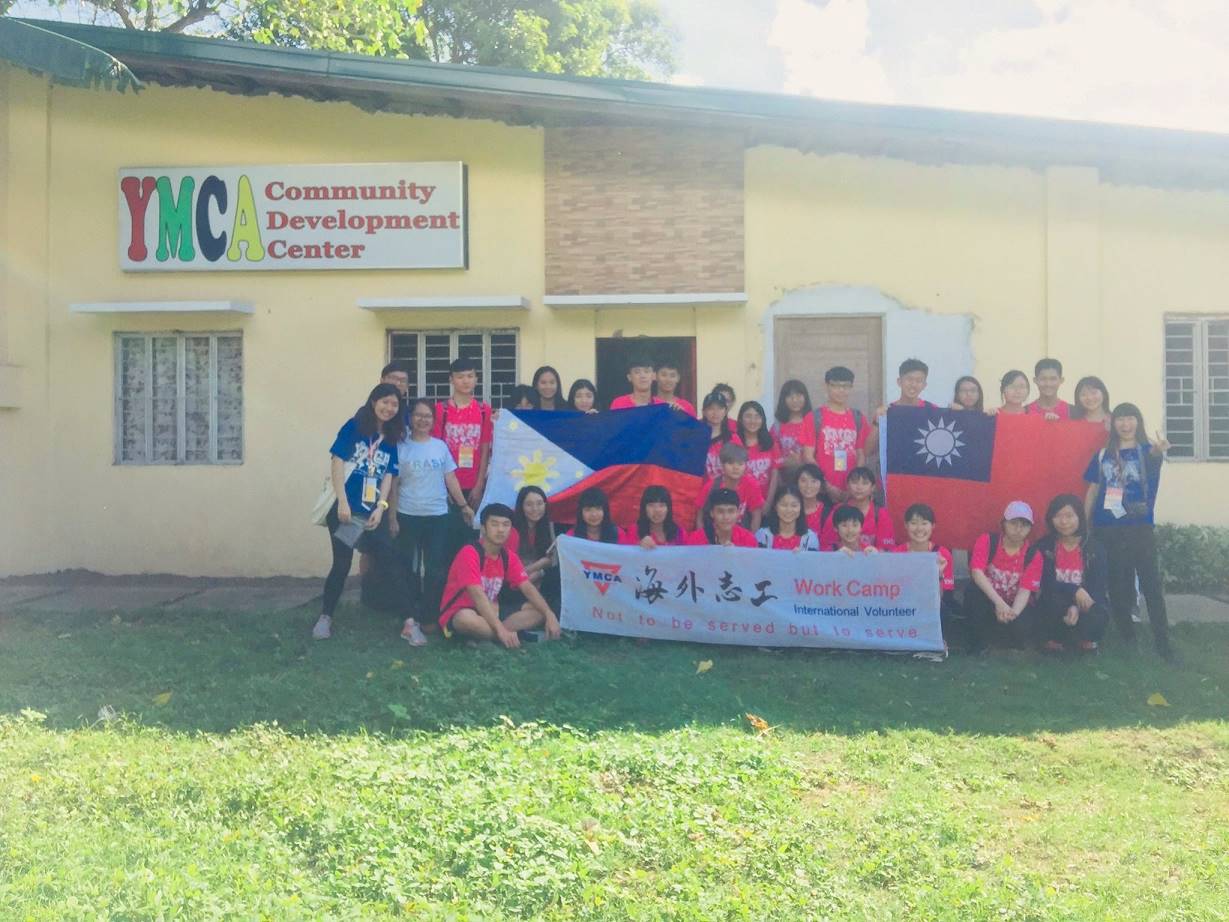 |
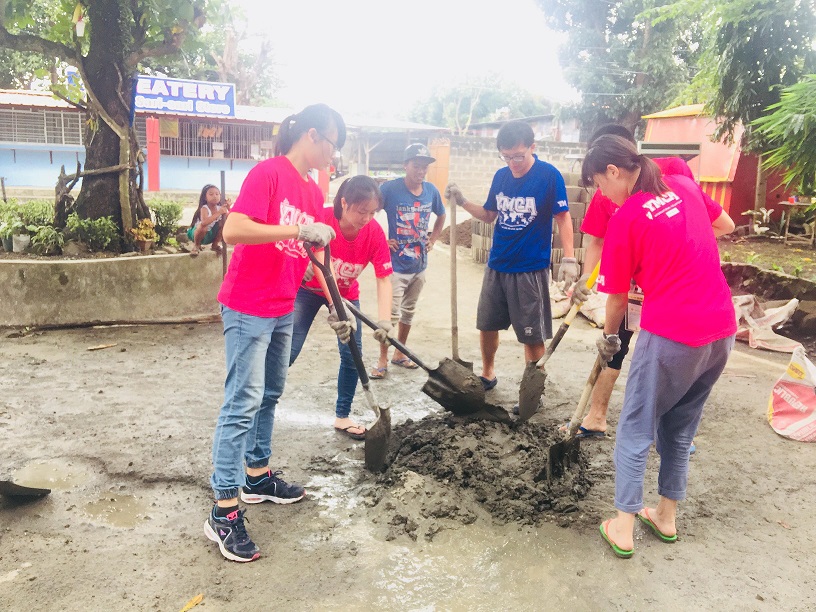 |
| ↑ San Pablo YMCA hosted 4th Taichung YMCA International Camp, from 25th January to 2nd February 2018
|
↑ Volunteering to do repair works in the YMCA
|
After construction work, campers had a chance to interact with YMCA adopted School's children, the Bagong Pook Elementary School, wherein most of the population have shanties along the railroad and beneficiaries of YMCA Feeding Program. Teaching and playing traditional games with children and conducting learning activities have made them more energetic and creative. At night time in the YMCA, campers had their "Learning and Sharing of Culture" time. Getting more familiar with each other and started to develop friendships. After hard works, campers were given chance to explore the city visiting some historical sites and exploring some of the seven lakes. Horseback riding and boating in Taal Lake from Tagaytay had given such an awesome experience to everyone! A night spent with Batang Y and their families is considered as one of the most very meaningful experience too! The "homestay" had taught the campers to understand real situations in the Philippine Family setting and made so many realizations of the value of relationship and real happiness, the inner self-satisfaction. A magnificent "Cultural Night" highlighted with various presentations signal the end of the camp. Indeed, the moment is a treasure to cherish.
The YMCA of San Pablo City, from its being a cocoon is now trying its best to become a colorful magnificent full grown butterfly spreading its brilliant wings. And with GATN, the "Service Trips", the door has finally opened for YMCA San Pablo and International Volunteers come and go, leaving good memories and bringing back a home bounty of unforgettable experiences from building constructions, learning, and meaningful life sharing with children, youth, and elders. The exchanges of culture through various innovative means giving the opportunity to gain priceless experiences and achievement of common goals. We're not just building structures but more importantly, the program provides a major platform for our young people to develop their inner talent and skills and most especially GATN is becoming the true agent of change and transformation.
GATN is building deeper relationships and partnerships. Truly, GATN is Making Community Alive around the Globe! With YMCA San Pablo existing community programs, our participants have the chance to interact with our adopted schools and communities and learn the diversities of life while enjoying the spirit of volunteerism.
~ Kristy Sumague, General Secretary, San Pablo YMCA
The 20th General Assembly of APAY
The General Assemblies of APAY are held at the end of each quadrennial of APAY. The objectives of the General Assembly are (i) to stimulate and renew YMCA leadership through discussions and the sharing of insights on existing realities that impact our societies and our YMCA activities. (ii) To demonstrate and experience the togetherness in mission that exists in the YMCAs in our region and within the global family of YMCAs at large; (iii) To search together for ways to witness the Good News in our region; (iv) To study as one body in discovering the stark realities of our region; and (v) To plan collectively for common actions of the YMCAs at the local, national and alliance level in responding to the challenges of our sub-regions, our region and the world as a whole.
The 20th General Assembly of APAY is due to be held in 2019. APAY has now launched the preparatory work for holding the General Assembly in a befitting manner. The first meeting of the APAY 20th General Assembly Planning Committee was held on 19th March 2018 at Hong Kong. The members met for the first time and decided on some important issues for holding the General Assembly.
The members of the GA Planning Committee elected Mr. Peter Malone (Australia) and Mr. Eldo George Pallikkara (India) as Co-chairpersons of the Planning Committee. This is for the third time that Peter Malone has been entrusted with the responsibility of the Co-chairperson. Mr. Eldo George is the Chairperson of the Youth Participation & Leadership Development Committee (YPLD). The other members are Ms. Lee Ji-Yang, Mr. Stephen Loh, Mr. Ch. R.P. Manikumar, Ms. Nagako Okado, Mr. Takashi Shono Mr. Seiichi Kanzaki, Mr. Kazuki Yamane, Mr. Babu Markus Gomes, Ms. Hiromi Nagao, Mr. Ronald Yam, Mr. Nam Boo Won, Mr. Duncan Chowdhury and Ms. Maria Christina Miranda.
The venue of the Assembly was confirmed to be held at Tozanso, in the city of Gotemba. Gotemba is a city on the south-eastern flank of Mount Fuji in Shizuoka Prefecture, Japan. This is about 100 kilometres from Tokyo and takes about one and an half hour ride from Tokyo.
The General Assembly will be held from Tuesday 3rd to Friday 6th September 2019. The APAY Executive Committee Meeting and the APAY Council Meeting will be held on Monday 2nd September 2019. All delegates are expected to arrive at Haneda or Narita Airport on the 1st of September and depart Tozanso in the afternoon of 6th September or in the morning of the following day.
The Youth Assembly will be held during 1st and 2nd September at Olympic Memorial Center, Tokyo. The youth delegates are expected to arrive at Narita Airport on 31st of August. The youth delegates will join the General Assembly at Tozanso after the Youth Assembly.
~ Duncan Chowdhury, Executive Secretary
International Conference in Celebration of the 30th Anniversary of the "88 Declaration" of the NCCK
With the theme “Cultivating Peace, Proclaiming Hope”, International Conference in Celebration of the 30th Anniversary of the “88 Declaration” of the NCCK was held in Seoul, South Korea on 5 – 7 March 2018. The objectives of the conference were: 1) to reflect 30 years’ foot-print of the Korean Church’s reunification movement; 2) to articulate theological vision on peaceful reunification of Korea; 3) to develop a middle-to-long term strategy and action plans for peace and reunification in Korea; 4) to strengthen the ties between the Korean Church and ecumenical partner churches/organizations; 5) to renew our commitment to the Pilgrimage of Justice and Peace (PJP) initiated by the WCC, and 6) to articulate a theological vision and hope for peace-making on the national, regional and global level.
There were about 130 participants from different church denominations and ecumenical organizations – over 40 overseas participants and over 80 domestic participants. Mr. Nam Boo-Won, GS of APAY, was invited as part of ecumenical partners that are committed to peace-building in the Korean Peninsula and Northeast Asia. The conference program was comprised of opening worship; intergenerational talk on people’s stories living in a divided nation including the story of Dr. David Suh who had been the chief editor of the 88 Declaration three decades ago; keynote addresses from NCCK and WCC; panel presentations and group discussions; and closing worship. At the end of the conference, participants unanimously adopted a Communique of the Conference, part of which I highlight below:
|
Cultivating Peace, Proclaiming Hope
“For he is our peace; in his flesh he has made both groups into one and has broken down the dividing wall, that is, the hostility between us.” (Ephesians 2:14)
God’s vision for this world sees swords being beaten into ploughshares (Isaiah 2:4), nations gathering together under the light of God’s justice and peace, sisters and brothers once in conflict embracing each other, and all God’s children fearing neither hunger, nor thirst nor threats of war. So long as nations practice invading each other, developing bombs and missiles to destroy each other, and refusing to sit at the table until unrealistic conditions are met then we move further away from God’s vision for our world. We invite Christians around the world and all people of good will to join us as we walk the path of peace with our God proclaiming the promise that God will one day redeem this whole creation….
In our gathering in Seoul on 5-7 March 2018 we heard stories of the agony of division from the people of the Peninsula and the Korean diaspora, and shared hopes for peaceful coexistence and reunification. Peace-loving Christians and citizens shared visions for peace and reconciliation, and policy experts and former government officials proposed realistic ways of achieving a sustainable peace system on the Korean Peninsula. However, outside of our conference we see national leaders continuing to cling to Cold War discourses, seeking to coerce each other by threat and use of force. Now as much as ever before we recognize the need to proclaim the principles of the ‘88 Declaration, as the issues it addresses remain powerfully and urgently salient today.
We reaffirm the five principles proclaimed in the ‘88 Declaration, which influenced later ROK government efforts at dialogue, and which are still necessary for resolution of division today: Independence, Peace, Grand National Unity, Humanitarianism and People’s Participation.
We again call ourselves, as Christians, to repent that too often we have turned ideologies of domination and imperialism and Cold War antipathy into idolatries that affirm and sustain the divisions separating North Korea from the South, from countries in the region and the West, and among factions within South Korea and each of our societies. When we regard the status quo as good and necessary, we obscure the complexity of historical and political factors behind the division, without and within Korean society, and we abdicate our collective responsibility to heal it. We confess that the Church has helped create and condone division, and has contributed language and theological frames that validate empire and structural violence, both between people and states. We believe that each side's preconditioned insistence on the other's retreat in the Korean context will only perpetuate the cycle of tension and division, and we call for those who would follow the example of Christ to seek peace by challenging not only the predominant powers of empire and war, but also the cultural values, social assumptions, and gender norms based on power and privilege.
Peaceful resolution to the continuing crisis on the Korean Peninsula can only come through authentic dialogue at the table to which the ROK and DPRK have now returned. We call on the United States of America to join them at the table of dialogue, so that hope for peace may be strengthened. We also call on China, Russia and Japan to work together with them for peace on the Korean Peninsula, and to develop a Northeast Asian common peace and security system….
Ultimately the best hope is that offered by the recently adopted Treaty on the Prohibition of Nuclear Weapons, that seeks to eliminate not only from the Korean Peninsula but from the entire world the most destructive and indiscriminate weapon of mass destruction ever devised by human beings, and which from any ethical point of view must be considered inherently condemnable. As a reciprocal measure in response to the DPRK’s indicated willingness to discuss denuclearization, we invite the South Korean government to consider signing this Treaty as an expression of intent….
Through this Conference we have reached a consensus that we must work together with renewed urgency to prevent another war in the Korean Peninsula, to reduce tensions and promote dialogue, and that establishment of a peace treaty for the Korean Peninsula is a critical and immediate necessity for denuclearization and peaceful coexistence on the Peninsula. We point to the fact that the division of Korea – and the suspended but unresolved state of war – is itself the root cause and rationale for ongoing military confrontation, the arms race and the proliferation of nuclear weapons in the region. Therefore we must remove the unresolved conflict and division as a source of tension and confrontation. In order to do so, we call for dialogue that is based less on narrow conceptions of national security, and more on people’s security.
In recognition of the emergency on the Korean Peninsula, we exhort the international ecumenical community to join us in this call for dialogue between the nations embroiled in this conflict, and to help us build peaceful and humanizing relationships across the borders of conflict through, among other things, the initiatives outlined in the Action Plan developed on the basis of discussions in this conference.
The ecumenical community has affirmed that God's peace and justice is based on the belief that without justice for all everywhere we shall never have peace anywhere. Indeed, peace in the world depends on realizing peace on the Korean Peninsula. In the 30 years since the 1988 Declaration we have been dedicated to cultivating peace. Like the persistent widow mentioned in Luke 18, we can claim hope as the fruit of our persistence, described in our conference as a "fierce patience." Paul's letter to the Galatians encourages us to "not grow weary in doing what is right, for we will reap at harvest time, if we do not give up" (Gal. 6:9). We recognize the political events of the day present us with Kairos moment. We stand at the edge of possibility, and with God's grace we proclaim that the time for peace on the Korean Peninsula is now.
7 March 2018
Participants of the International Conference
in Celebration of the 30th Anniversary of the 88 Declaration
For a full communique, please visit APAY website: www.asiapacificymca.org
|
~ Nam Boo Won, General Secretary
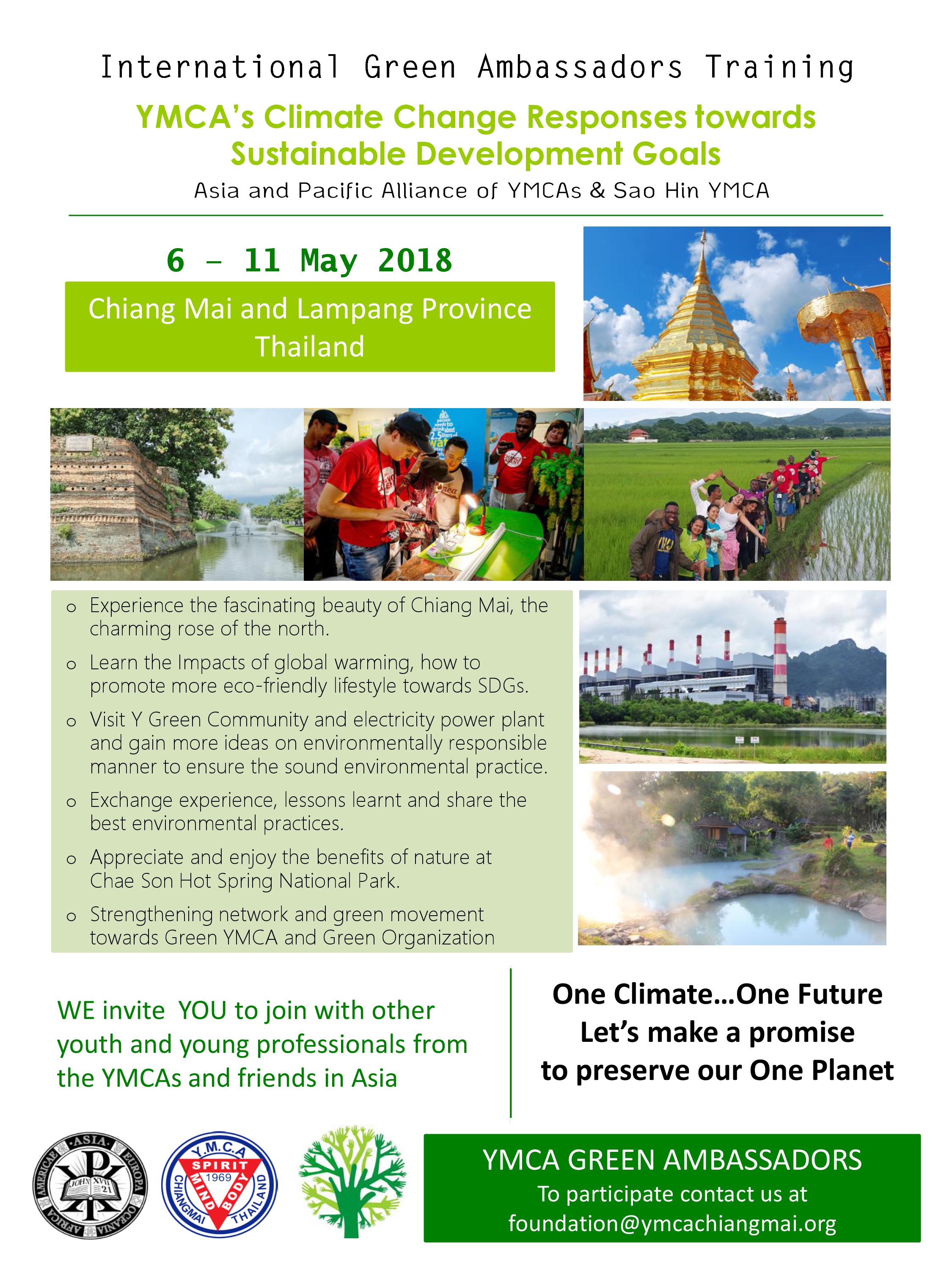
Farewell and Welcome to ICF Coordinators
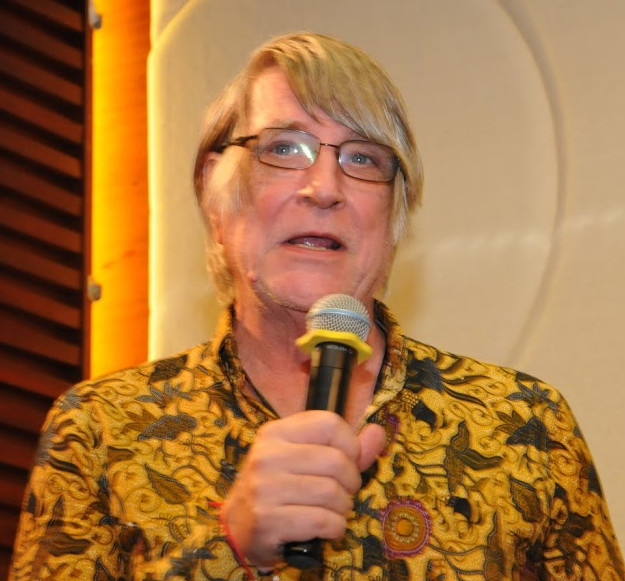 APAY bids farewell to Max Ediger, the Coordinator of Interfaith Cooperation Forum (ICF) as he retired from the services at the end of February 2018. APAY bids farewell to Max Ediger, the Coordinator of Interfaith Cooperation Forum (ICF) as he retired from the services at the end of February 2018.
Interfaith Cooperation Forum started its journey in the year 2003 a joint project of APAY and CCA then to equip the youths of Asia in responding to the challenges of the post-9.11 era. Peace activist Max Ediger has been associated with ICF since its inception, steering the Forum to its present day status as its chief coordinator.
The Asia and Pacific Alliance of YMCAs gratefully acknowledges the long outstanding contribution of Max Ediger for the key role he played in forming ICF and upbringing this forum to the present day status with a network spread in 10 countries in Asia and having more than 130 active youth alumni who have been trained in the ICF flagship program – the School of Peace. ICF has another couple of hundred of alumni who have participated in various workshops and mini-SoPs organized during these days.
Max Ediger will still be associated with ICF as a resource person based in Cambodia. We wish him a happy and healthy life, continuing his journey of mission.
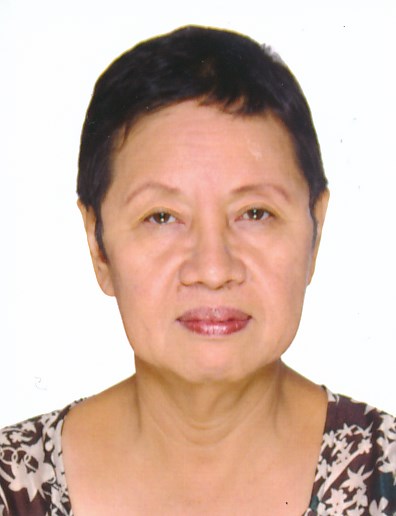 Along with the retirement of Max Ediger, APAY has appointed Dr. Muriel Orevillo-Montenegro as the new Coordinator of ICF. Dr. Muriel hails from the Philippines and has a rich experience in educational trainings related to peace as well as theological trainings. Along with the retirement of Max Ediger, APAY has appointed Dr. Muriel Orevillo-Montenegro as the new Coordinator of ICF. Dr. Muriel hails from the Philippines and has a rich experience in educational trainings related to peace as well as theological trainings.
She was the Dean of Silliman University Divinity School and more recently she was serving as the Coordinator of Justice and Peace Center at Dumaguete City in the Philippines.
She has an illustrious education background, holding a Ph.D in Systematic Theology from Union Theological Seminary, New York and holds 3 Master Degrees, one in Divinity, (Silliman University) and the others Sacred Theology & Philosophy (Union Theological Seminary).
Dr. Muriel will be based in Hong Kong at the office of APAY while the Program Officer of ICF, Hem Sopharak will be based in Cambodia at the ICF grassroots office.
We welcome Dr. Muriel to APAY and look forward to a wonderful working fellowship with her in Hong Kong. We hope and pray that she will be able to lead the ICF and add new dimensions in the activities of ICF. We request all concerned to extend a helping hand to Dr. Muriel in discharging her responsibilities as the new coordinator of ICF.
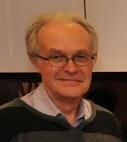 APAY gratefully acknowledges the exemplary services of Mr. Bruce Van Voorhis, the coordinator of ICF who was based in Hong Kong since 2009 also has retired on 31st January 2018. He was a social missionary seconded by the Global Ministry of the United Church of Christ, USA and serving as ICF Coordinator since then. APAY gratefully acknowledges the exemplary services of Mr. Bruce Van Voorhis, the coordinator of ICF who was based in Hong Kong since 2009 also has retired on 31st January 2018. He was a social missionary seconded by the Global Ministry of the United Church of Christ, USA and serving as ICF Coordinator since then.
Prior to that, Bruce was a staff member of several regional non-governmental organizations (NGOs) in Hong Kong – the Asian Human Rights Commission (AHRC) and Documentation for Action Groups in Asia (DAGA). He received a bachelor of journalism degree from the University of Missouri and a master’s degree in international relations from Boston University.
Bruce was a man of letters and had been contributing a lot in the field of publications of APAY, he was responsible for editing several publications of APAY and ICF.
APAY greatly acknowledges the outstanding contribution of Bruce Van Voorhis and wishes him a safe and sound retired life.
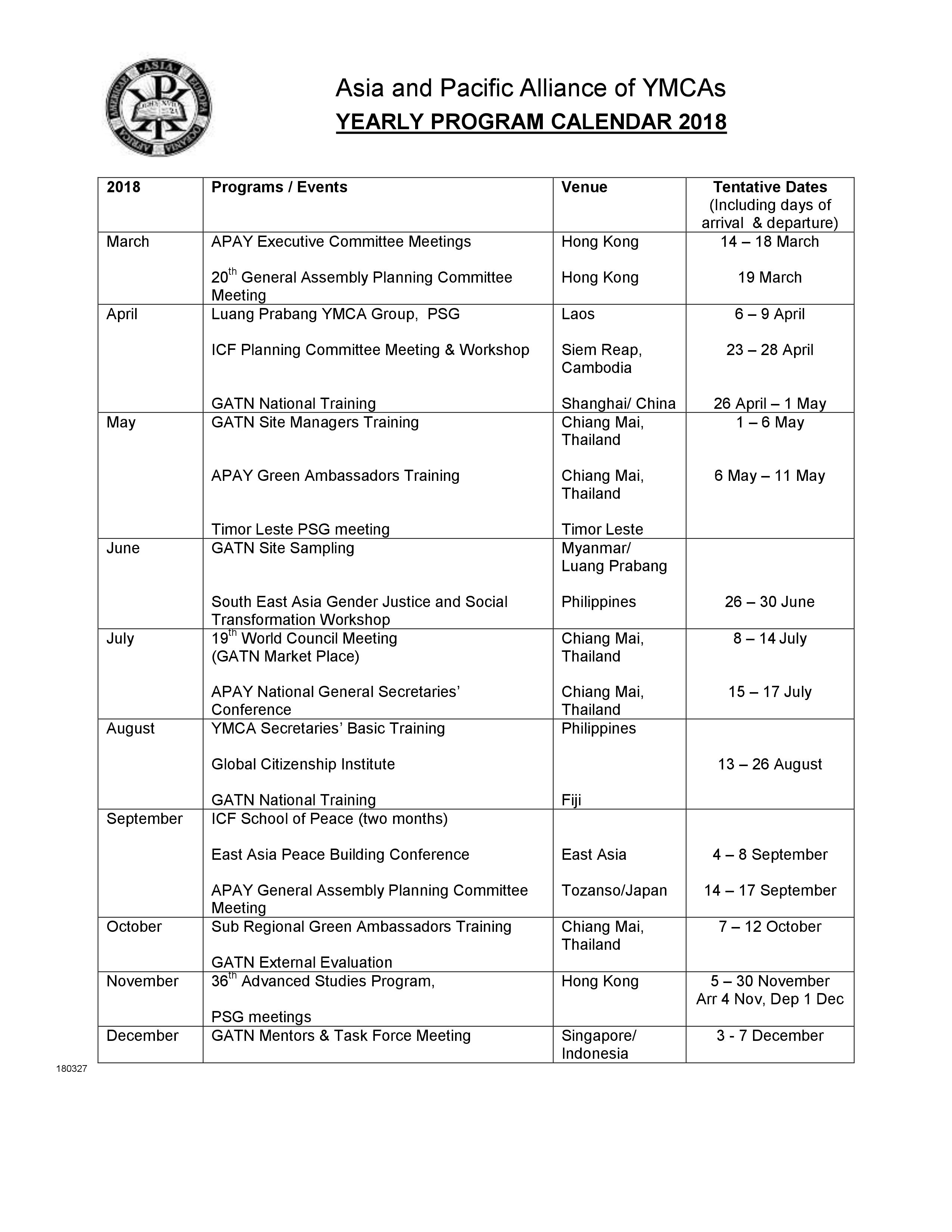
|
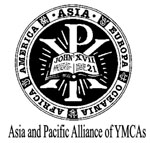










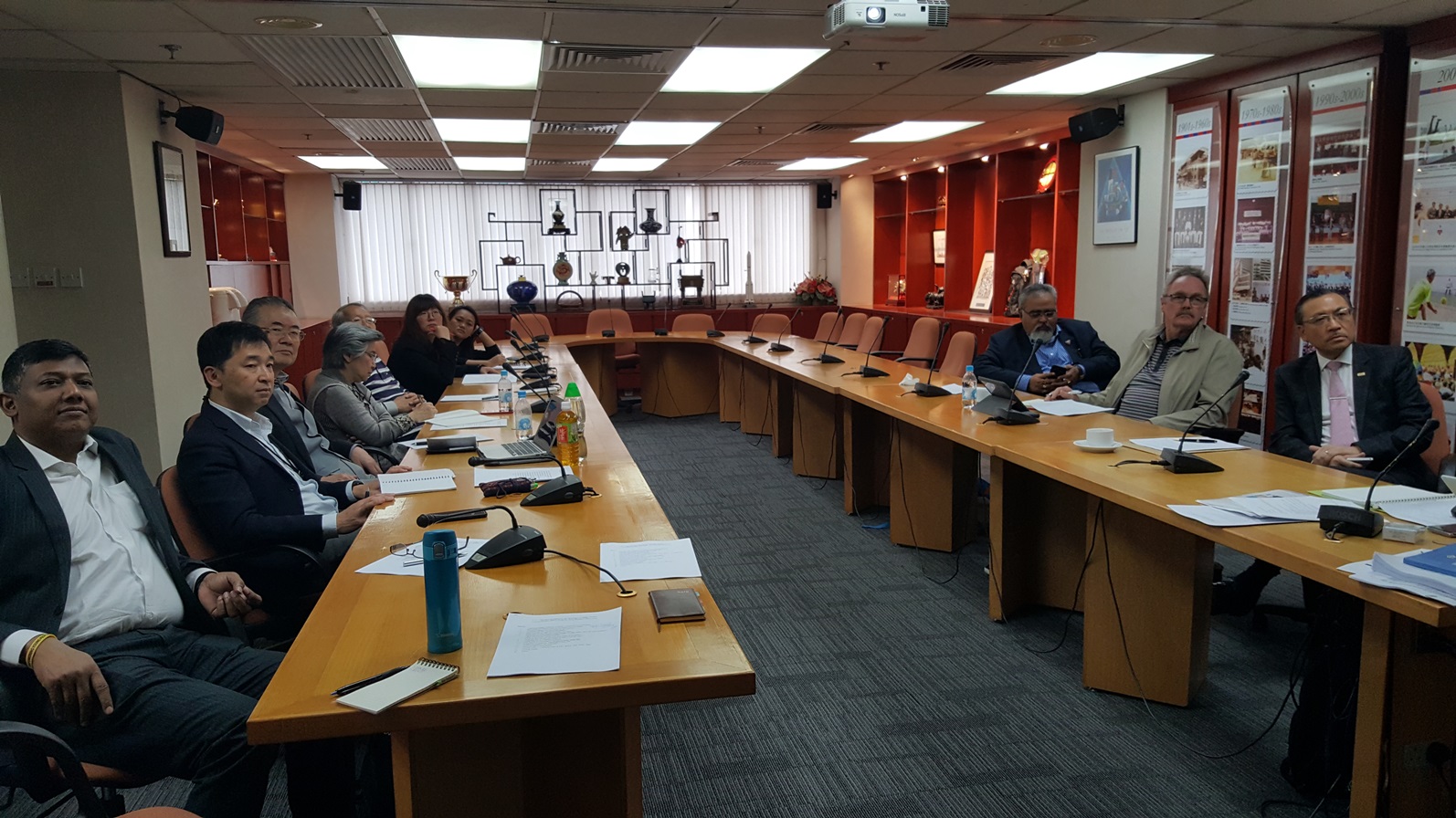

 APAY bids farewell to Max Ediger, the Coordinator of Interfaith Cooperation Forum (ICF) as he retired from the services at the end of February 2018.
APAY bids farewell to Max Ediger, the Coordinator of Interfaith Cooperation Forum (ICF) as he retired from the services at the end of February 2018. Along with the retirement of Max Ediger, APAY has appointed Dr. Muriel Orevillo-Montenegro as the new Coordinator of ICF. Dr. Muriel hails from the Philippines and has a rich experience in educational trainings related to peace as well as theological trainings.
Along with the retirement of Max Ediger, APAY has appointed Dr. Muriel Orevillo-Montenegro as the new Coordinator of ICF. Dr. Muriel hails from the Philippines and has a rich experience in educational trainings related to peace as well as theological trainings. APAY gratefully acknowledges the exemplary services of Mr. Bruce Van Voorhis, the coordinator of ICF who was based in Hong Kong since 2009 also has retired on 31st January 2018. He was a social missionary seconded by the Global Ministry of the United Church of Christ, USA and serving as ICF Coordinator since then.
APAY gratefully acknowledges the exemplary services of Mr. Bruce Van Voorhis, the coordinator of ICF who was based in Hong Kong since 2009 also has retired on 31st January 2018. He was a social missionary seconded by the Global Ministry of the United Church of Christ, USA and serving as ICF Coordinator since then.